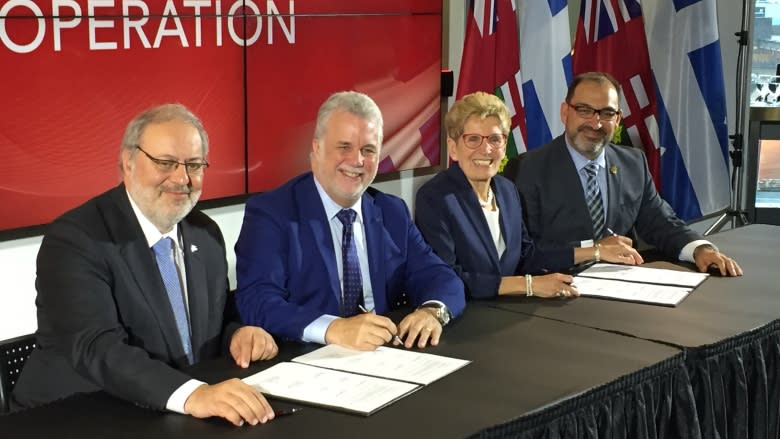If you thought you'll pay much less with Ontario's new hydro deal, think again
A deal to buy Quebec's cheaper and cleaner hydroelectric power will save Ontario millions of dollars, but there's little relief in the agreement for citizens in this province who are struggling to pay their hydro bills.
Ontario Premier Kathleen Wynne and Quebec Premier Philippe Couillard signed what was dubbed a historic hydro deal between Canada's two largest provinces on Friday, with Ontario
Ontario agreed to buy hydroelectricity from Quebec, and in return would save $70 million in costs over the course of the seven-year pact, but the province said the impact on individual consumers will be "modest."
"I think somebody's going to save money, but I doubt very much that it's going to be the people," said Natalie Hundt, a low-income mother of two who also goes to school.
"The trickle down effect has demonstratively not worked."
Hundt said she has put LED light bulbs in all her fixtures and only runs her dishwasher and major appliances after peak periods, but her Hydro bill is going up even though her consumption is going down.
"The bill is high and it's incrementally going up," said Hundt, who is also a volunteer with the low-income advocacy group, Association of Community Organizations for Reform Now.
"I'm trying to, you know, feed the children healthy and keep them in a safe, clean neighbourhood but when I see my hydro bill sometimes I lay up at night after I get them and I wonder how long I can sustain this because it's breaking my budget," she said.
Friday's pact comes on the heels of electricity price hikes in Ontario that have helped to make Kathleen Wynne's Liberal government very unpopular, at least according to some opinion polls. In fact, some experts are blaming the Liberals' byelection loss to the Progressive Conservatives in the Toronto riding of Scarborough-Rouge River last month on rising hydro rates.
The Ontario-Quebec agreement is not just about the money. It also means Ontario will save one million tonnes of greenhouse gas emissions annually by switching some of the system away from natural gas and using hydroelectricity instead.The signatories to the deal would not disclose the cost per kilowatt hour at which Ontario was purchasing the energy. The governments said because of "competitive pressures" the price was confidential.
Ontario Energy Minister Glenn Thibeault recognized that individual consumers would not save much money, but said it was an important step forward for the province.
"If we can find ways that we don't need to continue to put more costs into the system, and we're doing that today, this announcement is pretty significant for us," said Thibeault at the signing ceremony.



